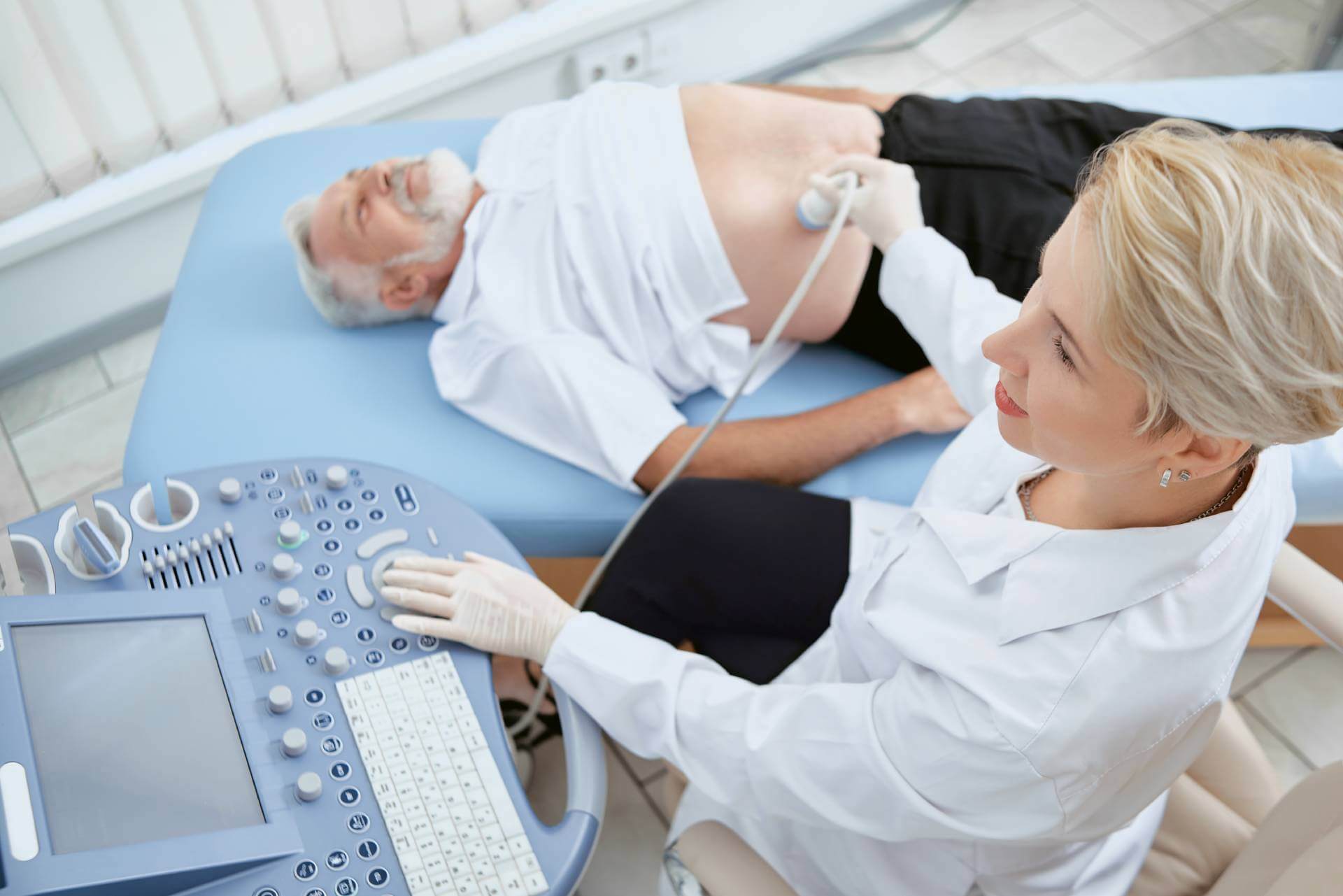FibroScan® in Lubbock, TX
What is FibroScan?
FibroScan is an ultrasound technology used by the GI specialists at a Lubbock Digestive Disease Associates location to noninvasively check the liver. Also referred to as transient elastography, the scan utilizes a certain ultrasound technology to evaluate the occurrence of fibrosis and steatosis in the liver. Fibrosis takes place when the liver substitutes healthy tissue with cicatrix (scar) tissue to heal itself from an underlying condition. Hepatic steatosis is also identified as fatty liver disease and happens when fat accumulates in the liver cells.
Using FibroScan, your Lubbock, TX GI specialists may evaluate the state and working condition of your liver and make a diagnosis and treatment plan without intrusively probing the body to explore the liver. If you have a liver problem, reach out to your nearest Lubbock Digestive Disease Associates location to see if FibroScan ultrasound technology could benefit you.

Who is a candidate for FibroScan testing?
FibroScan analysis might be recommended for patients who have initial to advanced liver illness or other conditions. These could include:
- Primary biliary cholangitis (PBC)
- Cirrhosis of the liver (severe scarring)
- Hemochromatosis
- Metabolic syndrome
- NASH or nonalcoholic steatohepatitis
different kinds of chronic liver disease (CLD) - Alcoholic FLD
- Certain types of hepatitis
How is FibroScan conducted?
You will not be sedated throughout the procedure. You will be asked to relax on your side, and a Lubbock Digestive Disease Associates nurse will gradually insert a small flexible pipe in and through your anal sphincter and into the rectum. You may feel moderately uncomfortable, however, you should feel no pain. Measurements will be taken of the response of your inner muscles and assessed by your GI provider. The exam could last between 10 to 20 minutes, and you will discuss the results with your specialist directly after. Following your anorectal manometry test in Lubbock, TX, you will be free to go home and resume your normal diet and activities.
How are FibroScan results understood and explained?
FibroScan results are provided in accordance with fatty liver disease (steatosis) grade of severity and fibrosis score. The following charts are comprised of approximate knowledge relating to what the outcome of the examination may signify. You can discuss your results in detail with your Lubbock Digestive Disease Associates GI specialists following your FibroScan scan.
Steatosis grade of severity: The fatty change result characterizes the level of steatosis in the liver and is delivered by means of a CAP score (controlled attenuation parameter), which is calculated in dB/m (decibels per meter). The range is from 100 to 400 dB/m, and assorted ranges cause various steatosis grades.
Fibrosis score: The fibrosis result is a valuation of the hardness of the liver and depicts the layer of scarring that the liver has experienced. Your GI providers will utilize your FibroScan findings along with your medical history to ascertain your fibrosis value. Different liver conditions and diseases can change the fibrosis score.
F0 to F1: No scarring/mild scarring
F2: Moderate scarring
F3: Severe scarring
F4: extremely progressive scarring (cirrhosis)
What are the benefits of FibroScan?
Because FibroScan utilizes ultrasound technology, there is little to no risk associated with this procedure. FibroScan is a non-invasive imaging technique, and for that reason, it is virtually painless. It allows for a broader study of the entire liver instead of only viewing a small fragment that takes place in a liver biopsy. Moreover, no sedation medication is needed for the treatment, it is relatively affordable, quickly accomplished, and the results are prompt.

State-of-the-art care for liver conditions
FibroScan® FAQs
Is there any necessary prep for the FibroScan exam?
You will be instructed not to drink or eat anything at all leading up to your FibroScan test. You can take your daily medications, however. We encourage you to come in wearing loose-fitting clothes to make it easier for us to access the right of your ribcage. Someone from our team will review all these instructions with you ahead of your exam so you know what to expect before, during, and after FibroScan testing.
What liver concerns will FibroScan evaluate?
A FibroScan test can diagnose and record the growth of several liver diseases, including:
- NAFLD (nonalcoholic fatty liver disease)
- Alcoholic liver disease
- Non-alcoholic steatohepatitis (NASH)
- Hepatitis B and C
- Hemochromatosis
Is there a difference between FibroScan and an ultrasound?
The FibroScan test is a variation of ultrasound that uses transient elastography, the same technology a normal ultrasound uses. Although the two are very similar, FibroScan was developed in order to evaluate how stiff the liver is and, therefore, is much more sensitive to finding issues in the liver than an ultrasound.
Is FibroScan more advanced than a liver biopsy?
FibroScan is a common nonsurgical and minimally invasive alternative for a liver biopsy. However, there can be certain circumstances in which a biopsy of the liver might be ideal. This may include circumstances in which a person has a pacemaker or defibrillator, is pregnant, or has fluid in the abdomen. It has also been determined that results may be distorted in individuals who are morbidly obese. Keeping all of this in mind, our Lubbock Digestive Disease Associates providers will closely work alongside you to help you decide if the FibroScan test or a standard liver biopsy is better for you.